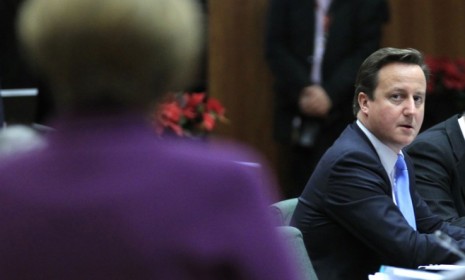The 'historic' economic deal to unite Europe — without Britain
After Prime Minister David Cameron vetoes a treaty to save the euro, the eurozone casts the United Kingdom aside and forges ahead

A free daily email with the biggest news stories of the day – and the best features from TheWeek.com
You are now subscribed
Your newsletter sign-up was successful
Friday was a "historic" day for Europe. After British Prime Minister David Cameron vetoed a European Union treaty aimed at saving the euro, the eurozone countries plowed ahead with a new treaty for deeper fiscal integration. Britain's refusal to join leaves the island nation economically isolated from the continent, and raises questions about Cameron's leadership, the British economy, and the country's future place in the EU. Here's what you should know:
What exactly happened?
During a dramatic meeting of European leaders that went into the wee hours of Friday morning, British Prime Minister David Cameron effectively vetoed a European Union treaty aimed at solving the continent's massive debt crisis by imposing tighter fiscal integration and regulation among the 27 EU nations. The 17 EU members on the euro, along with six non-eurozone countries, agreed to the treaty from the start. Hungary, Sweden, and the Czech Republic initially resisted, but eventually bowed to diplomatic pressure. That left Britain isolated as the lone standout.
The Week
Escape your echo chamber. Get the facts behind the news, plus analysis from multiple perspectives.

Sign up for The Week's Free Newsletters
From our morning news briefing to a weekly Good News Newsletter, get the best of The Week delivered directly to your inbox.
From our morning news briefing to a weekly Good News Newsletter, get the best of The Week delivered directly to your inbox.
What's in this deal?
The inter-governmental accord seeks to forge closer fiscal ties among EU nations. The new agreement includes automatic sanctions on eurozone nations with deficits greater than 3 percent of their GDP; requirements that national budgets be submitted to the European Commission for review; and a stipulation that eurozone countries add a "balanced budget" provision to their national constitutions. The deal also calls for the eurozone and generous EU members to give as much as $269 billion to the International Monetary Fund to aid the continent's debt-soaked countries. The final treaty could still take months to negotiate.
Why did Cameron oppose the treaty?
He said relinquishing too much control of his country's economy to the EU wasn't in Britain's best interest, particularly because exemptions weren't granted for the country's financial services sector, which makes up about 10 percent of Britain's economy. "What is on offer isn't in Britain's interests, so I didn't agree to it," he said.
A free daily email with the biggest news stories of the day – and the best features from TheWeek.com
What will this mean for Britain?
For starters, Britain's Labour party is lashing out at the Conservative prime minister's decision. Cameron made a "catastrophic decision to walk away," and now "26 countries [will] make crucial decisions without us," says Labour leader Ed Miliband in Britain's Guardian. It leaves Britain dangerously isolated, like "a rowing boat next to a supertanker." Financial analyst Max Keiser calls it a suicidal move that will ravage the British economy and "finish" Cameron's tenure as prime minister. Give him a break, says Halah Touryalai at Forbes. "If Angela Merkel and David Cameron's roles were switched, you'd be hard pressed to see Germany signing into an agreement that it felt was not in its best interest. Why would anyone want to be pulled in closer to the euro mess if they didn't have to be?"
And the rest of Europe?
Friday was "a day of historic, seemingly tectonic shifts in the architecture of Europe," say Steven Erlanger and Stephen Castle in The New York Times. Twenty years ago, the Maastricht Treaty formed the EU — "not just to integrate Europe, but to contain the might of a united Germany." And now, a wealthy Germany has "effectively united Europe under its control, with Britain all but shut out." But France may be the real winner, says Paul Taylor at Reuters. "Napoleon dreamed of it, De Gaulle fought for it, but Nicolas Sarkozy may have achieved it — a Europe of Nations with France in the cockpit and Britain on the sidelines."
Sources: Associated Press, BBC, Forbes, Guardian (2), MarketWatch, New York Times, Reuters, RT
-
 Is Andrew’s arrest the end for the monarchy?
Is Andrew’s arrest the end for the monarchy?Today's Big Question The King has distanced the Royal Family from his disgraced brother but a ‘fit of revolutionary disgust’ could still wipe them out
-
 Quiz of The Week: 14 – 20 February
Quiz of The Week: 14 – 20 FebruaryQuiz Have you been paying attention to The Week’s news?
-
 The Week Unwrapped: Do the Freemasons have too much sway in the police force?
The Week Unwrapped: Do the Freemasons have too much sway in the police force?Podcast Plus, what does the growing popularity of prediction markets mean for the future? And why are UK film and TV workers struggling?